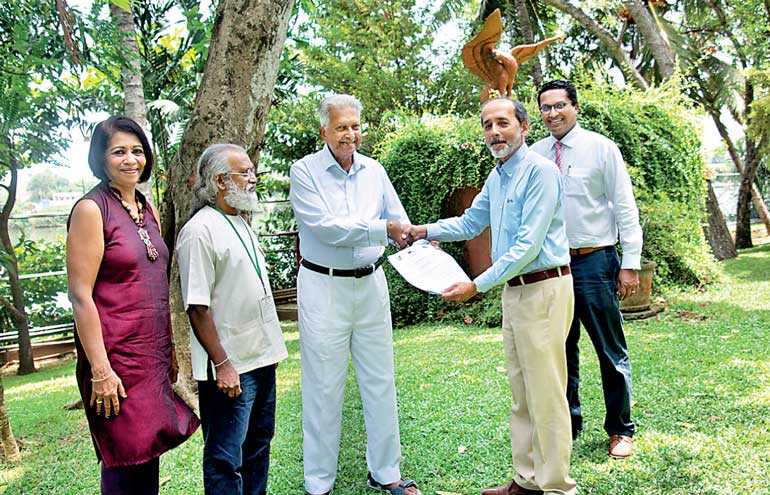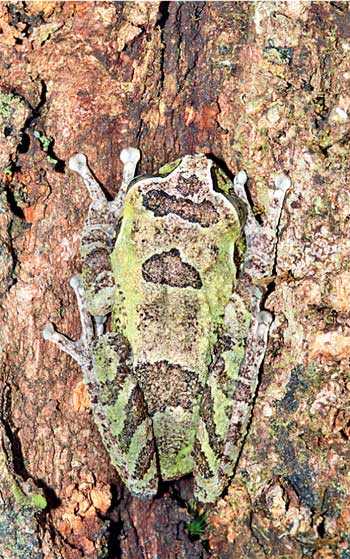Friday Feb 20, 2026
Friday Feb 20, 2026
Thursday, 13 February 2020 00:14 - - {{hitsCtrl.values.hits}}

Dr. Rohan Pethiyagoda handing over the agreememnt to Dilmah Founder Merrill J. Fernando. From left: Shiranee Yasaratne, Prof. Sarath Kotagama and Dilmah CEO Dilhan C. Fernando

Almost 120 species of frogs inhabit Sri Lanka, the vast majority of which are found nowhere else in the world. The island was also home to more than a dozen amphibian species that now seem to have become extinct. Both these factors help to rank Sri Lanka as one of the world’s critical hotspots for amphibians.
Dilmah Conservation, the environmental arm of Dilmah Tea, will join forces with conservationists from Global Wildlife Conservation in the US, the Durrell Wildlife Conservation Trust in the UK and the IUCN Species Survival Commission to train and lead a preliminary workshop from 17-21 February in Sri Lanka with herpetologists and field experts to update the global conservation status of Sri Lankan amphibians by building a national scientific platform to include them on the Global IUCN Red List. 
Amphibians are key indicator species and play an important role as biological pest controllers in ensuring food security and in reducing the spread of insect-borne diseases, especially when the effects of climate change are deeply felt.
Dilmah Founder Merrill J. Fernando signed a memorandum of understanding in August 2019 with the Durrell Wildlife Conservation Trust and Global Wildlife Conservation which looks towards updating the global conservation status of Sri Lankan amphibians and building national capacity through an extinction-risk assessment for every species for the IUCN Red List, which will unfold in several stages.
It will also include the identification of key biodiversity areas within Sri Lanka where there are greater numbers of critically endangered amphibian species.
Conservation Scientist Rohan Pethiyagoda commended the initiative stating: “The new assessment of Sri Lanka’s amphibian species will help flag those species in most urgent need of conservation action and help mobilise resources towards drafting and implementing recovery plans. This is an essential first step, and it is great to see Dilmah collaborating with the IUCN Species Survival Commission, the Durrell Wildlife Conservation Trust and Global Wildlife Conservation in getting this done. Of course, the biggest challenge comes after that, in working with the departments of Wildlife Conservation and Forest Conservation to actually take the necessary measures to save those species which are at greatest risk.”
Some 78 of Sri Lanka’s amphibious species are shrub frogs of the genus Pseudophilautus, which occurs only in Sri Lanka and India’s Western Ghats. With the active involvement of herpetologist Mendis Wickramasinghe, Dilmah Conservation has, between 2012 and 2018, been engaged in assessing amphibian populations and species in the island. This work led to the discovery of a new species, Pseudophilautus dilmah (Dilmah Shrub Frog), named aptly for Dilmah’s contribution in protecting these sensitive creatures, which are critical to the balance of our ecosystem, through scientific research and by creating awareness. Discovered at Sri Lanka’s first tea garden at Loolcondera, the Dilmah Shrub Frog stands to celebrate the enduring connection the tea company has shared with nature for the last three decades.
Dilmah’s founder Merrill J. Fernando noted: “Raising awareness of biodiversity and its importance is essential towards ensuring its conservation. We must cultivate an interest and encourage a sense of shared responsibility towards the protection of habitats and ecosystems and mitigate the detrimental practices that hinder conservation.”